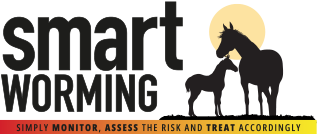Faecal Egg Counts (FEC)
This simple test on freshly passed faeces tell us how many worm eggs are present and from which species. Testing one horse's faeces is better than none, but remember that testing groups of horses at the same time is best of all. The FEC can tell which adult worms are present in the horse's intestinal tract.
Foals and yearlings have different types of worm (such as Parascaris and Strongyliodes) that are not important for adult horses, but can cause disease in foals and yearlings.
Generally it is recommended to check an FEC 2-3 times per year for low risk adult horses, and 3-4 times per year for high risk horses such as youngstock.
This test is not reliable for picking up tapeworm eggs.
Faecal Egg Count Reduction Test (FECRT)
A faecal egg count reduction test (FECRT) is simply an FEC that is checked two weeks after a dewormer has been given- this checks that the dewormer has been effective. The egg count at this stage should be zero or almost zero. If the egg count has not been reduced after deworming, it could be an issue with how the dewormer was given, or could be a sign of resistance, where the dewormer was given properly, but the worms survived despite being exposed to the dewormer. It is recommended that this test for resistance is done once a year.
Download your SMART worming schedule
Tapeworm
Tapeworm Test
Unlike other sorts of parasites, tapeworms remain a threat to horses throughout their life (from a few months of age). A large burden of tapeworms is associated with certain types of colic. Tapeworm eggs might show up on a faecal sample submitted for an FEC, but the eggs are shed sporadically in little packages, so FEC are not accurate for telling us how many eggs are being shed onto a pasture from that individual horse.
If we want to get a better estimate of risk of disease from tapeworms, there are some antibody tests that can be performed. A salivary sample, or blood sample can be sent to a laboratory for this measurement to be taken.
Foals under a few months of age are not at risk from tapeworm because the lifecycle has not had time to complete. After a year of age, a tapeworm burden might become important, and from that age onwards the risk is similar throughout the horse's life.
